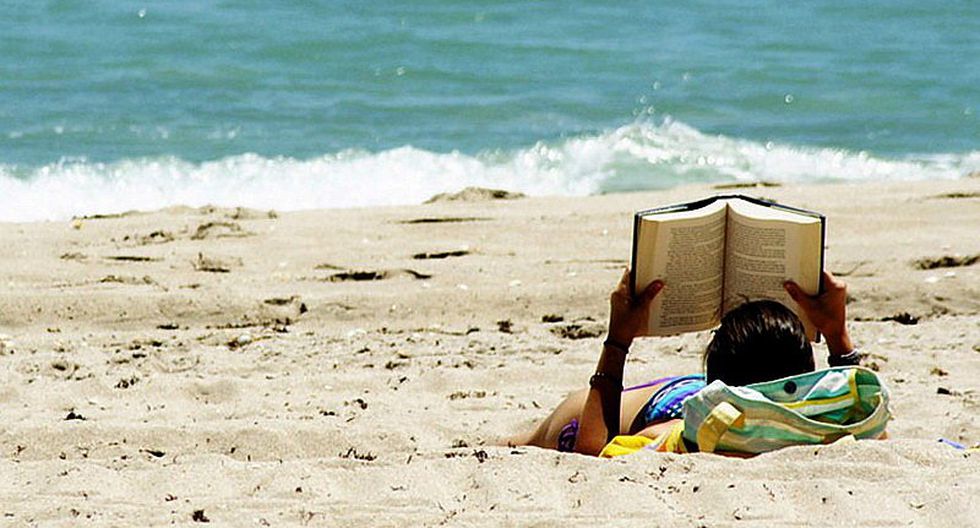This literary year is going to be very special, with a lot of time ahead to deliver us to the letters with the home confinement for the coronavirus. The latest from renowned authors such as Ian McEwan, Almudena Grandes or Bernardo Atxaga coexist with more representatives of a new feminine wave in Latin American literature, of which Paula Vázquez or Elizabeth Duval are a good example.

We know that there is a love for reading, and a lot, among Elle.es readers. Topics on books tend to be among your favorites and, among them, literary novelties, such as the one we did on the best books of 2018 and 2019, cause special expectation. Now come those of 2020, a year that is being conditioned by isolation of the coronavirus.
We have a lot of time to spend reading, and we want to give you some good ideas. You can buy all these books on Amazon in their paper version and they also have a digital version that you can buy on Kindle.
What do we start with? With some novels set in the Franco dictatorship; with trips to a United States that oscillates between rock and religious sects; with innovative proposals like that of Elif Shafak or Emilie Pine, some of the best female voices of her generation … As always, stop by and read.
There are many ways to talk about machismo, and the Basque author Karmele Jaio has hit the nail on the head with the idea of ’La casa del padre’ (Destino, 17.95 euros), one of those novels that leave you ruminating for several days. . Because machismo is not only that a woman be beaten or despised, it is also all the handicaps that are installed against her in our culture. In the novel we are going to meet two people. Ismael, a writer blocked before his next work whose mother suffers a serious accident and is forced to stay by his side, which will lead him to remember a terrible fact from his childhood. Jasone is his wife and the first reader and proofreader of his texts; he also wrote but left it, until now he has started a new draft. A work that will remind us of the enormous importance of the genre with which we are born.
‘The Cockroach’ (Ian McEwan)
The author of ‘Atonement’ returns with a novel that will remind us of one of the great works of world literature, ‘The Metamorphosis’, by Franz Kafka. But in ‘La cucaracha’ (Anagrama, 17 euros), the start of the story is the other way around: a roach wakes up in the morning and has become a human … But not just anyone, but nothing less than the British Prime Minister. A criticism of Boris Johnson? Of course, and also to Brexit. Because those cockroaches that become politicians come up with crazy ideas? For example, they want to establish ‘reversionism’, consisting of paying for work and being given money to buy things. McEwan approaches the situation in the United Kingdom with anger and scorn – although he insists that it is a work of fiction -, while giving a critical review of the role of the media in these crises.
‘Something to believe in’ (Nickolas Butler)
Be careful, we may be facing one of the first great novels of the year. Libros del Asteroide publishes ‘Something to believe in’ (20.85 euros), the third novel by the American Nickolas Butler, after ‘Love songs at point-blank range (2014)’ and ‘The heart of men’ (2017). It is a warm and intimate work, with wonderful descriptions of the characters, one of those that you do not mind guessing the development of the plot because you enjoy it with enthusiasm. We traveled to a town in Wisconsin, where the couple formed by Lyle and Peg, who lost a child as a child, are happy for the return of their other daughter, Shiloh, the single mother of little Isaac. But Shiloh begins to relate to an evangelical pastor who has an enormous influence on her and Lyle will debate whether to protect his family from this character or let him run …
‘The journey of the eels’ (Albert Lladó)
Things happen on the periphery of big cities. Authors such as Juan Marsé or Elvira Navarro have shown us, and now it is the turn of Albert Lladó, journalist in ‘La Vanguardia’ and editor of ‘Revista de Letras’, who tells us of a Barcelona in the early 90s that did not It has nothing to do with the Olympics. From a neighborhood in Barcelona that lived on the fringes of that shining brilliance. ‘The crossing of the eels’ (Gutenberg Galaxy, 14.72 euros) walks between social denunciation and nostalgia to take us to meet a group of teenagers who learned to survive –and built their own language– on the streets where they abounded evictions, police raids, low-flying criminals, battered women, and men who self-destruct in bars. An epic and warm allegory to the reality of the other neighborhoods and the relationships that are forged in them.
‘Everyone loves Daisy Jones’ (Taylor Jenkins Reid)
With no scheduled release date, Amazon Prime Video is preparing the adaptation of this novel by Reese Witherspoon, who fell in love with it with great enthusiasm: “I devoured this novel in one day. Daisy conquered my heart,” said the actress of ‘ Big Little Lies’. It is known that it will have 12 chapters, that it will star Riley Keough – Elvis Presley’s granddaughter – and that she will play the leader of Daisy Jones & The Six, a group that in the late 70s is among the most influential in rock. ‘Everyone loves Daisy Jones’ (Blackie Books, 21.75 euros) covers the childhood, adolescence and early youth of the dreamy Daisy, who will end up becoming a legend, in conjunction with Billy Dunne, a crazy musician who is famous and fatherhood surpass him.
‘In the distance’ (Hernán Díaz)
We are not going to deceive you, when you start reading this book it will be uphill. It is not easy, it is sometimes thick and sandy but that is one of its great findings: to transfer sensations, landscapes, thoughts to the viewer. One of the best books of 2020 is this ‘In the distance’ (Impedimenta, 21.62 euros), the first novel by the Buenos Aires-based writer based in New York Hernán Díaz. It tells the story of Håkan, ‘the hawk’, a Swedish immigrant who comes to California in the Gold Rush and sets out on a long journey to search for his brother, who has allegedly arrived in New York. The book is the wonderful narrative of his journey, with fantastic descriptions such as that of the Irish gold digger or a cruel sheriff. In parts of his journey he will end alone and in others he will exile himself. The volume was a finalist for the Pulitzer Prize in 2018.
‘West End’ (José Morella)
Would we be able to say that mental health is no longer a taboo? The books, both fiction and essays, gradually contribute to talking more openly about madness, dementia, psychiatric problems … We are sure that ‘West End’ (Siruela, 18.95 euros), Novel Prize Café Gijón 2019. will be another of those volumes that will allow you to speak without qualms. The protagonist is Nicomedes, a man with delicate mental health who has spent 50 years in a town in Andalusia but who, with the rise of tourism in the 70s, must emigrate to Ibiza with his four children to give them a future with more opportunities. Morella denounces the little sensitivity that society has had with the mentally ill and, particularly, the marginalization to which they were subjected in the last years of the dictatorship.
‘My last 10 minutes and 38 seconds in this strange world’ (Elif Shafak)
For the neophytes in Elif Shafak, let’s start by telling that she is a writer born in Strasbourg, of Turkish parents, settled between Istanbul and London, whose stories are usually carried out by minorities, immigrants and strong women. ‘My last 10 minutes and 38 seconds in this strange world’ (Lumen, 18.90 euros) is his new novel, which has been a finalist for the Booker Prize, which has already been translated into 17 languages and has sold more than 300,000 copies . Leila’s heart has stopped beating, and her body lies in a garbage container in Istanbul. In the ten minutes in which his brain still works, all kinds of thoughts and memories appear: his childhood, the flight to the big city to escape a marriage of convenience, the experience of love … But while he is dying, his friends they look for it. A novel close to death that celebrates the meaning of life.
‘Empty houses’ (Brenda Navarro)
In recent times, we have been fortunate to have a few maternity books published that speak in a different light from having a child. And we are glad of the arrival of another fantastic work, ‘Empty Houses’ (Sixth Floor, 16.05 euros) that, we anticipate, is as extraordinary as it is tough. Mexican writer Brenda Navarro talks about how motherhood can be a nightmare through two women: one, who loses her son in the park; another, who kidnaps him to raise him as his own, for which the child has two mothers. The book tackles issues such as intimacy, family violence, social inequality, loneliness, accompaniment, care, guilt and love with harshness, devastation and difficulty.
‘Everything I can’t say’ (Emilie Pine)
In our article on ‘The best books of 2019’ we talk about Sally Rooney, author of ‘Normal People’, one of the works that marked the last quarter of last year. Emilie Pine and Rooney are the two great exponents of current Irish literature, although Pine’s volume, ‘All I Can’t Say’ (Random House Literature, € 17.95) is now a collection of autobiographical essays with a collection of feminine themes, but of those that sting. No posturing, happy motherhood, patriarchy, etc. Her writings speak of alcoholism, abortions, rapes, depression and silence. All this happens, much more than we think. And so it is necessary to talk about it; of anger, terror, sexual violence, etc. Although it is silent. Although also write about how to work hard, regain strength and raise your voice. Because it is always better to fight than to be silent, to die on your feet than to live on your knees.
‘The stars’ (Paula Vázquez)
At Elle.es, we have become fans of the Tránsito publishing house, which, with Sol Salama at the helm, publishes books of those that make you explode, which you cannot stop recommending because they are authentic jewels, one after another . We have talked about ‘Las mothers no’, by Katixa Agirre; we have talked about ‘Quiltras’, by Arelis Uribe. They start the year by publishing in Spain ‘Las estrellas’, the first film by Paula Vázquez, founder of Lata Peinada – the first bookstore specialized in Latin American literature in Spain -, a book with which you have to be willing to break your heart. A mother and daughter seek reconciliation and a return to emotional proximity while one of them is on the verge of death. Devastating.



